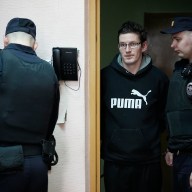 New York City’s e-cig ban goes into effect April 29, but some businesses and enthusiasts aren’t entirely sure how the law will be enforced.
New York City’s e-cig ban goes into effect April 29, but some businesses and enthusiasts aren’t entirely sure how the law will be enforced.
Credit: Joe Raedle/Getty Images
It might be a drag for some, but as of Tuesday anyone caught smoking an e-cigarette or a vaporizer pen in bars, restaurants, parks and beaches across New York City faces the same punishment that tobaccos smokers have faced since 2002.
Former Mayor Michael Bloomberg capped off his administration by signing into law an amendment to the city’s existing ban on cigarettes, extending it to cover vapor-based devices.
Back in 2003, when the original smoking ban came into effect, Bloomberg was hailed by public health advocates and admonished by those who saw it as government overreach.
Those same kudos and complaints resurfaced 10 years later when the city council passed an amendment to include vapor devices — which contain no tobacco but mostly use nicotine-based liquids.
Ilona Orshansky was at City Hall last fall when lawmakers debated the bill. One month earlier Orshansky, a California native, opened up Brooklyn’s first vape shop near the Williamsburg waterfront, aptly named Brooklyn Vaper.
“It’s going to be impossible to enforce this,” she said of the modified law. “As soon as you light up a cigarette in a space, everybody can tell. You vape — two, three seconds — that whole scent goes away.”
Enforcement of the city’s anti-smoking regulations already falls mostly on the health department, which said that compliance with the Smoke Free Air Act “has been over 98 percent since its enactment” 10 years ago.
“We expect that this amendment will also be easy for businesses and property owners to understand, comply with and enforce in their settings,” a spokesperson with the agency wrote.
The department added that citations will not be issued until Aug. 1, and signage will not be required to be posted until Oct. 26.
As with regular tobacco products, anyone caught breaking the law can be fined up to $100 per offense. A business found to be breaking the law can be fined between $200 and $400 for a first offense.
Last month, a smoker’s advocacy group, Citizens Lobbying Against Smoker Harassment, filed a lawsuit in Manhattan Supreme Court challenging the law’s expansion to include vapor devices.
However, Orshansky’s business will largely be immune from the city’s new requirements. Her shop makes more than 50 percent of its earnings through vaping products, which means her customers can vape inside the store.
“People can vape in here as much as they want,” she explained. “But as soon as they walk out this door, all of a sudden it’s illegal for them to vape in the hall.”
She remembered hearing then City Council Speaker Christine Quinn making the case that vaping in public spaces would “renormalize” smoking “because many of the e-cigarettes are designed to look like cigarettes.”
Except, Orshansky said, most personal vaporizers don’t look like cigarettes.
The e-cigarettes commonly found in bodegas and minimarts are largely produced by companies purchased by tobacco companies such as Altria — formerly Philip Morris. They are mostly disposable and use proprietary flavor cartridges.
By contrast, the devices that Orshansky sells are customizable and can use any number of e-juices stocked at the store, including flavors such as cappuccino, cotton candy and any number of fruity options.
Critics often point to the variety of flavors — which many allege are targeted to kids — as reason to monitor the liquids used in vapor devices, most of which still include nicotine. The Food and Drug Administration announced last week that it would seek to regulate how the liquids are manufactured and sold.
Orshansky’s shelves are stocked with vials of different flavors. On Friday, one regular customer, Matt, was in the store to replace a part for his vaporizer and stock up on his liquid of choice: milk and honey.
The ban won’t affect Matt for very long — he said he’s moving to different city soon. He switched to the device two months before, having smoked multiple packs a day before his boss turned him on to a vaporizer.
Matt chuckled at the suggestion that the different varieties of liquids are only targeted to children.
“Because adults don’t like cake?” he asked.
Vape Shops Around the Five Boroughs
This is a corrected story. An earlier version of the story incorrectly identified broke down the fine amounts for those caught violating the city’s smoking ban. We regret the error.
Follow Chester Jesus Soria on Twitter@chestersoria
















